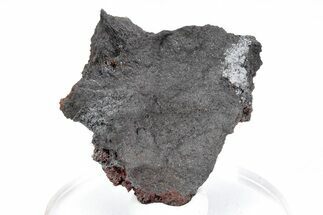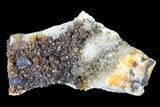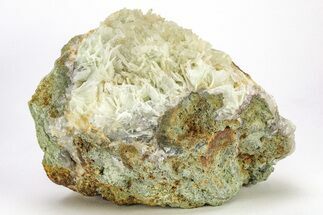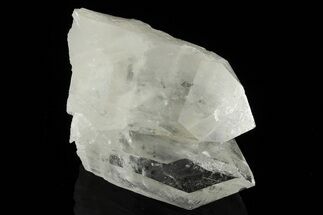This Specimen has been sold.
4.2" Quartz Cluster with Botryoidal Pyrolusite - Diamond Hill, SC
This small quartz cluster from Diamond Hill, South Carolina, is covered in a thin, natural iron and manganese oxide coating which gives the crystals their black and orange coloring. There are also two botryoidal formations of pyrolusite that protrude from the quartz crystals.
It comes with an acrylic display stand.
It comes with an acrylic display stand.
The Diamond Hill Mine is located in the southern portion of the Appalachian Mountains in South Carolina. Erosion over millions of years exposed this 3-acre spot of mountain that produces some of the widest varieties of quartz variations in the world. Quartz variations such as amethyst, smoky, skeletal(elestial), milky, phantomed, iron and manganese oxide coated, and even aura quartz are know to have been deposited here through silica-rich hydrothermal processes. Other minerals including beryl, epidote, and garnet are known to come out of this location as well.
About Quartz
Quartz is the name given to silicon dioxide (SiO2) and is the second most abundant mineral in the Earth's crust. Quartz crystals generally grow in silica-rich environments--usually igneous rocks or hydrothermal environments like geothermal waters--at temperatures between 100°C and 450°C, and usually under very high pressure. In either case, crystals will precipitate as temperatures cool, just as ice gradually forms when water freezes. Quartz veins are formed when open fissures are filled with hot water during the closing stages of mountain formation: these veins can be hundreds of millions of years old.
Quartz is the name given to silicon dioxide (SiO2) and is the second most abundant mineral in the Earth's crust. Quartz crystals generally grow in silica-rich environments--usually igneous rocks or hydrothermal environments like geothermal waters--at temperatures between 100°C and 450°C, and usually under very high pressure. In either case, crystals will precipitate as temperatures cool, just as ice gradually forms when water freezes. Quartz veins are formed when open fissures are filled with hot water during the closing stages of mountain formation: these veins can be hundreds of millions of years old.
Pyrolusite is a mineral consisting of manganese dioxide (MnO2) and is important as an ore of manganese. It has a silvery metallic luster, a black or bluish-black streak, and readily soils the fingers. It commonly is found in finely packed fibrous, acicular, and radial forms composed of very fine needles or fibers.
SPECIES
Quartz, Manganese/Iron oxides & Pyrolusite
LOCATION
Diamond Hill, South Carolina
SIZE
4.2" long, 2.2" wide
CATEGORY
ITEM
#72048
 Reviews
Reviews















